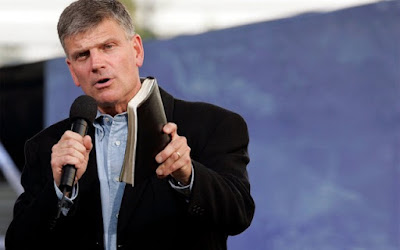Will Franklin Graham Lead an Evangelical Exodus From the GOP?
Can't blame him.

ENOUGH
Since Republicans took over Congress I can't name one notable accomplishment. In fact you would think the Democrats were in charge!
In this last spending bill their only retort was...where do we sign.
Remember the uproar, the videos, regarding PP? It just went up in smoke. I mean Christ...you got to stand for something.
---------------------------------------
Franklin Graham announced this week he was leaving the Republican Party as a result of the inclusion of Planned Parenthood funding in the spending bill that sailed through Congress last week. While he's the first to formally bail, he might not be the last.
Billy Graham's son is over the GOP.
(click)
(click)
WOW...Barry's got them trained better than a procession of elephants at Barnum and Bailey's.
Franklin Graham, who heads the Billy Graham Evangelistic Association, posted on Facebook yesterday that he plans to leave the Republican Party. His growing frustration highlights growing (and sometimes paradoxical) anger that pro-life and evangelical Christian leaders have for Republican Party leadership.
Graham took to Facebook to rip Republicans in the wake of a spending bill the House passed last week that maintains federal funding for Planned Parenthood.
"Seeing and hearing Planned Parenthood talk nonchalantly about selling baby parts from aborted fetuses with utter disregard for human life is reminiscent of Joseph Mengele and the Nazi concentration camps!" Graham wrote, referring to videos that showed Planned Parenthood officials discussing their fetal tissue donation program. "That should've been all that was needed to turn off the faucet for their funding.
"This is an example of why I have resigned from the Republican Party and declared myself Independent," he continued. "I have no hope in the Republican Party, the Democratic Party, or Tea Party to do what is best for America."
On one hand, comments like this aren't particularly out-of-character for Graham. On Nov. 6, he told CNN that he wasn't particularly enamored of the GOP.
"I don't have any faith in any of the political parties," he said. "The only hope that we have is for God to intervene and I want the church to stand up and to vote."
And he made a similar, politically agnostic comment in May, as The Christian Post reported.
That said, yesterday's comment raised eyebrows because it's a commitment to officially break with the Republican Party. And evangelical leaders say he's channeling a sentiment that's increasingly widespread in their community.
After the House voted to pass the omnibus spending bill that kept federal dollars in place for Planned Parenthood, many conservative Christians—evangelical and Catholic—were furious.
Robert Jeffress, the pastor of First Baptist Church in Dallas, said the uproar isn't surprising.
"This Planned Parenthood sponsorship in this bill further confirms what many evangelical Christians believe about the Republican Party establishment, and that is, there's not a dime's worth of difference between the Republican establishment and the Democratic establishment," he said.
"This is an example of why I have resigned from the Republican Party and declared myself Independent," said Graham.
"And I believe that disenchantment that many evangelical Christians have explains the rise of Ted Cruz and Donald Trump," he added.
Jeffress said this disenchantment has been growing for more than a decade, especially since George W. Bush's 2004 presidential campaign. During that race, Bush pushed for a federal constitutional amendment to ban gay marriage as part of a strategy to get evangelical Christians to the polls. It worked, and he got re-elected thanks to their strong showing. But in his second term, the president and his team abandoned their promise to try to write a gay-marriage ban into the Constitution. And that left many evangelicals feeling used and betrayed.
Brent Bozell, a prominent conservative activist who founded the Media Research Center, said Graham's split from the Republican Party is especially devastating because of his role as a faith leader, rather than a political one. Graham isn't known for his politicking; rather, evangelicals know and respect him for his disaster relief work—in particular, for the Operation Christmas Child shoebox-donation program that figures prominently in how hundreds of churches celebrate Christmas.
"He's not taking a political position," said Bozell. "He's taking a moral position, which is far more serious in the evangelical world."
That means Graham's excoriation of party leaders carries special significance.
"When they're funding the murder of children, this is where the evangelicals say, enough is enough," Bozell said.
Ed Martin, the president of Eagle Forum—a conservative activism organization that Phyllis Schlafly started—called the inclusion of Planned Parenthood in the spending bill "an extraordinary betrayal."
"When Franklin Graham and others say, 'Hey, don't put all your hope in a party because that's not the ultimate hope and should not be the focus of this earthly realm,' we recognize that," he said. "So there's a tension that you want to further the values informing your heart and life through politics, through policy. But you also want to say, don't make a political party a false god. Any false god will fail you. There's only one true God."
But there's an irony in this conservative frustration with the Republican Party over abortion: That's because 2015 brought tons of wins for the pro-life movement. Republican state legislatures passed dozens of restrictions on the procedure, and Mother Jones reported that abortion clinics "are closing down at a rate of 1.5 every single week." And the Centers for Disease Control also found that the country's abortion rate reached a record low this year.
Despite that, the loss in Congress has many conservative Christians reeling. And Graham's comments will fuel that anger.






